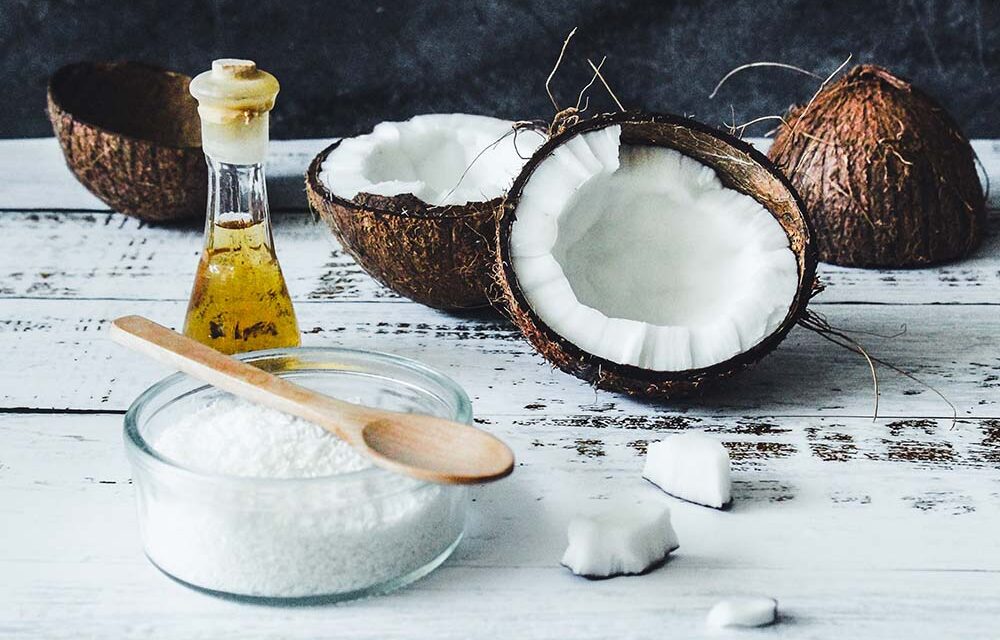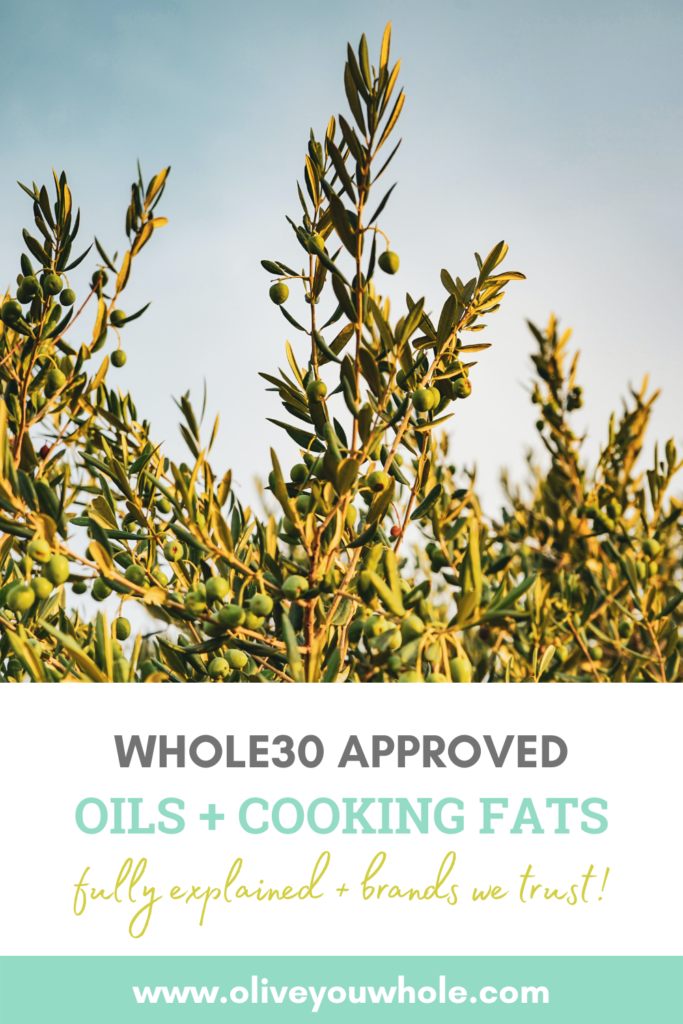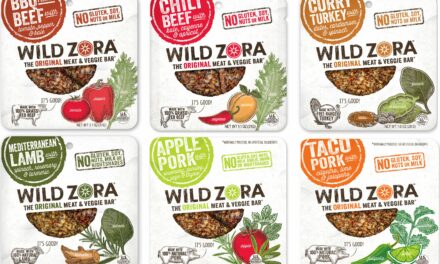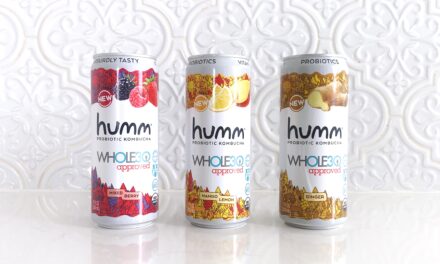What oils are Whole30 Compliant? This is probably the question I get the MOST when it comes to the Whole30 “Can I have…” type questions. And that’s because it’s hard to know which oils are Whole30 compliant… In this post, we’ll go over all of the basics of Whole30 Oils and Whole30 Cooking Fats to ease your mind!
Which Oils are Whole30 Compliant Oils?
The Whole30 Compliant Oils that are great as Whole30 cooking oils are:
- Olive Oil
- Coconut Oil
- Avocado Oil
- Palm Oil
Whole30 Cooking Fats
In addition to the oils listed above, here are some additional Whole30 Cooking fats you can use:
- Ghee (clarified butter)
- Palm Oil
- Coconut Milk or Coconut Cream
- Duck Fat
- Lard (pork fat)
- Tallow (beef fat)
- Goose Fat
- Chicken Fat (Chicken Schmaltz)
- Bison Tallow (Thunderfat)
- Wild Boar Lard
- Lamb Tallow
Whole30 Seed Oils for Minimal Use at Home or at a Restaurant
These Whole30 oils are made from seeds, and are less healthy for you than the ones listed above, so they shouldn’t be your primary Whole30 Cooking Oil choices… BUT they are technically compliant, otherwise you would never be able to eat out at restaurants because most restaurants use these oils.
- Safflower Oil
- Sunflower Oil / High-oleic Sunflower Oil
- Canola Oil
- Rapeseed Oil
- Grapeseed Oil
- Sesame Oil
- Palm Kernel (or seed) Oil
Whole30 Approved Oils
Whole30 Approved Olive Oil Brands
- Primal Kitchen Extra Virgin Olive Oils (use my coupon code OLIVEYOUWHOLE)
- California Olive Ranch Extra Virgin Olive Oil
- Lucini Italia Extra Virgin Olive Oil
- Botticelli Olive Oil and Extra Virgin Olive Oils
- Oleamea Extra Virgin Olive Oil
Whole30 Approved Avocado Oil Brands
Whole30 Approved Coconut Oil Brands
Whole30 Approved MCT Oil Brands
Whole30 Approved Ghee Brands
- Fourth & Heart Ghee (I can’t live without the Himalayan Pink Salt Ghee!)
- Pure Indian Foods Ghee
- Tin Star Ghee
- Nutiva Vegan Ghee
- FatWorks Organic Grass Fed Cultured Cow Milk Ghee
- FatWorks Grass Fed Goat Milk Ghee
Whole30 Approved Cooking Fats
- FatWorks Duck Fat
- FatWorks Lard (pork fat)
- FatWorks Tallow (beef fat)
- FatWorks Goose Fat
- FatWorks Chicken Fat (Chicken Schmaltz)
- FatWorks Bison Tallow (Thunderfat)
- FatWorks Wild Boar Lard
- FatWorks Lamb Tallow
- Shop all of FatWorks on Amazon here
What oils are NOT allowed on Whole30?
Because according to the Whole30 rules, legumes and grains are out for 30 days, the following oils are NOT allowed on Whole30 (even at restaurants):
- Corn Oil
- Rice Bran Oil
- Soybean Oil
- Peanut Oil
For more Whole30 Resources, click here!
Frequently Asked Questions:
Is Olive Oil Whole30 Compliant?
Is olive oil allowed on Whole30? Yes, not only is olive oil Whole30 compliant, but it will be one of the oils you use most during your Whole30.
Is Avocado Oil Whole30 Compliant?
Yes, avocado oil is Whole30 compliant and you can use it freely for cooking, dressings, and sauces. It’s delicious! Primal Kitchen is my favorite brand of Whole30 avocado oil and extra virgin avocado oil.
Is Coconut Oil Whole30 Compliant?
Yes, coconut oil is Whole30 compliant and can be used as a delicious cooking fat. It tends to be more flavorful than olive or avocado oil, so take that into account when you’re making a recipe.
Is MCT Oil Whole30 Compliant?
Yes! MCT oil is derived from coconuts, and is Whole30 Compliant.
Is Palm Oil Whole30 Compliant?
Yes, palm oil is Whole30 compliant. Just like olive oil and coconut oil, palm oil is derived from the fruit of the palm tree (not the seed). This makes it a great choice as a cooking oil.
Is Palm Kernel Oil Whole30 Compliant?
Yes, palm oil is Whole30 compliant, conditionally. Unlike Palm Oil (above), palm kernel oil is extracted from the seed of the palm fruit. This means it falls into the seed oil category, and should be used minimally at home, in you buy products, or at restaurants.
Is Sesame Oil Whole30?
Yes, sesame oil is Whole30 compliant, conditionally. See the note on seed oils above. I personally only use Sesame Oil in small amounts to add flavor to dishes. You’ll find sesame oil in a lot of my Whole30 Asian dishes.
Is Sunflower Oil Whole30 Compliant?
Yes, sunflower oil is Whole30 compliant (so is high-oleic sunflower oil), conditionally. See the note on seed oils above.
Is Sunflower Oil Whole30 Compliant?
Yes, sunflower oil is Whole30 compliant, conditionally. See the note on seed oils above.
Is Canola Oil Whole30 Compliant?
Yes, canola oil is Whole30 compliant, conditionally. See the note on seed oils above.
Is Rapeseed Oil Whole30 Compliant?
Yes, rapeseed oil is Whole30 compliant, conditionally. See the note on seed oils above.
Is Grapeseed Oil Whole30 Compliant?
Yes, grapeseed oil is Whole30 compliant, conditionally. See the note on seed oils above.
Is Safflower Oil Whole30 Compliant?
Yes, safflower oil is Whole30 compliant, conditionally. See the note on seed oils above.
Is Cottonseed Oil Whole30 Compliant?
Yes, cottonseed oil is Whole30 compliant, conditionally. See the note on seed oils above.
Is Vegetable Oil Whole30 Compliant?
No, vegetable oil is not Whole30 Compliant. Vegetable oils contain way more Omega-6’s than our bodies need, and high levels of Omega-6’s lead to inflammation in the body.
Is Peanut Oil Whole30 Compliant?
No, peanut oil is not Whole30 Compliant because legumes are not Whole30 compliant.
Is Rice Bran Oil Whole30 Compliant?
No, rice bran oil is not Whole30 Compliant because grains are not Whole30 compliant.
Want to save this Whole30 Oils and Cooking Fats resource for later? Pin it here!












